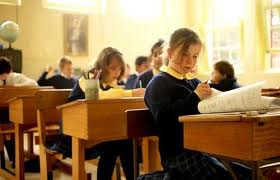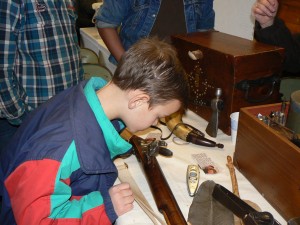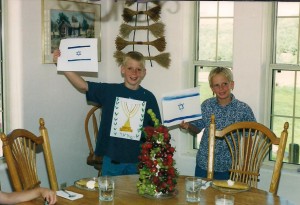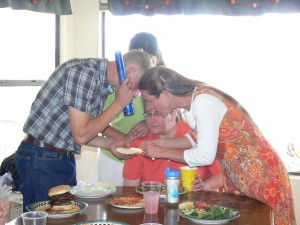Homeschooling the Young Child Who is Resistant
 In response to my recent post titled Traditional Education – Is it Really the Best Way to Teach our Children?, Lily left a comment saying…
In response to my recent post titled Traditional Education – Is it Really the Best Way to Teach our Children?, Lily left a comment saying…
“Very Interesting! I understand that all children are gifted in different areas, but for those who bulk at the basics at an early age, in spite of following Charlotte Mason style principles, what should one do? Should you keep trying different approaches, for example Dianne Craft’s techniques until something clicks? Up to this point, when one of my students has had difficulties, I have tried a dozen different curriculum choices, different learning style approaches, and lots of praying until I found something that worked or at least made it easier for the child. Is that the best approach?”
I thought my response would be much too long for a comment, hence the post. I do not consider myself to be an expert by any means but I do have some definite feelings on the topic based on things I’ve read as well as observed.
My thoughts on homeschooling the upper grades are constantly being reevaluated and thought through again and again as you can tell from my posts here and here – but my feelings on young childhood learning have stayed the same.
In my beginning years of homeschooling I was heavily influenced by Dr. Raymond and Dorothy Moore. They were one of the original pioneers of homeschooling and their homeschooling philosophy is so sound and full of wisdom that I can’t get away from it. They have both passed away but they have left us with timeless wisdom in their books that cover raising children, homschooling children, raising healthy children and managing your home. If I were to suggest any one author (which is so very hard to do) for you to read that would help you form your homeschooling philosophy, it would be the Moore’s.
To answer Lily’s comment and question…
“I understand that all children are gifted in different areas”
This is something that we all must recognize. God has uniquely fitted each child with their own gifts and abilities but most of the time we feel constrained to teach our kids like everyone else. Homeschoolers are a little more adventurous in their choices of curriculum – but not always and public schools are the worst. Books are the same for all students, answers must be the same, individuality is not rewarded. We end up with kids whose love of learning has been crushed, who cannot really think deeply about any matter of importance and who only have a smattering of knowledge about any one subject.
#1 Let’s let our children explore their areas of interest. There will be many. Often, after pursuing their subject, that interest will fade away but they will have connected with the information they learned and will retain it. It was not something that was spoon fed to them. They did the work of learning it.
“…but for those who bulk at the basics at an early age, in spite of following Charlotte Mason style principles, what should one do? Should you keep trying different approaches, for example Dianne Craft’s techniques until something clicks?”
Spend Time
I don’t know what exact age Lily is referring to but I have yet to see a child bulk at spending time with mom or dad. Kids love it when we do things with them. Play games with them, read, bake, garden as well as many more things that could be added.
Play educational games. Our phonics program has a card game similar to Go Fish with the Alphabet written on the individual cards. Another phonics card game has phonograms. This is fun to them. No, it’s not sitting at a desk and yes, you may be lying on the floor as you play this but your child is learning and enjoying it. Memory is another great game.
How about making some kind of store where they buy items with real or pretend money and practice their addition skills? Cooking is another way to practice fractions as well as beginning math.
Writing could be grocery lists, letters to grandparents, pictures they draw and then write captions or stories for, etc. If it’s creative writing and the child does not feel like doing the actual writing, I would do it for them since their hands get so tired from holding their pencil which may cause them to avoid writing. Children like seeing their words on paper but they don’t want to have to do all the writing.
Reading – the most wonderful thing you could do with your child, I think. Read with expression. Make the characters come alive. Read books that are not twaddle. There are some really dumb books out there in the young children’s section. Avoid these. It can be really hard to find good ones but I’d look for lists of recommended books at Ambleside Online or other places. If you can give your child a love of reading, the world is open to them. They can learn anything.
Unit Studies – a great way to teach
I feel unit studies are one of the best ways to engage children when they are young. We used Greenleaf Guide books – Old Testament History, etc. and made it into a unit study. We studied mountain men, pioneers, Indians and pirates.
As parents, we know our children the best. We can see and sense when they have a learning difficulty. If that is the case, yes, let’s see what Dianne Craft and others say. But if it’s just that they’re young, let them be children and let them have lots of freedom to explore, pretend and play.
Head Start? – Where’s the Proof?
Research has shown, according to Dr. Moore and others, that children who start formal schooling at ages 8-10 show no difference in growth once they reach their teens, contrasted to those who started early. Wow! What’s the hurry? Why do we feel so pressured?!
We’ve been led to believe that our children are failing if they don’t go into the system and become a cookie cutter student. There’s a lot of competition in the homeschooling circles, too. The real measurement of where a child is in his learning is not by how many textbooks he’s finished but if he can converse with you and others about what he’s read as well as practicing what he’s learned.
Schools Kill Thinking
If you listen to Sir Ken Robinson in his talk about Changing Education Paradigms , he talks about divergent thinking. An example of divergent thinking is giving someone a paper clip and asking them to name as many uses as they can for it. Usually they will name about 20 things but if they’re really good they may name a few hundred. They are considered genius.
If you go to a school and ask the children to do this exercise, you might be surprised at who does the best.
The Kindergarten class!
Following that, 1st graders, 2nd graders and on up until about 5th-6th grade where they don’t do so well. Divergent thinking starts dying out in the kids as they get more educated!
Relax
If your child is not at the same level as other children, relax. When you are reading and playing with them, they are not behind. They are learning much more than if you had made them sit down at a desk and force fed them.
And don’t forget, as adults we are still learning. It never stops. There are gaps in everyone’s education – but help instill in them that love of learning while they are young and they can fill those gaps in as they see necessary or as their desire dictates.
Enjoy this time with your child and don’t turn it into a battleground.
Travelling the same homeschooling journey,
Elisabeth
P.S. I know I sound as if all public schooled kids are non-thinkers. I know this is not true. There are some that are thinkers and do love to learn but this is definately the minority, in my opinion.



2 Comments
Lily
Lovely post! I don’t have time to really comment right now…school and guests this week, but I’m pondering all you’ve said and I’ll comment later. Have a blessed day!
Lily
You’ve offered so many helpful suggestions!
My homeschooling “theories” have evolved as I have gone along. At first, I thought the ONLY way to learn was by replicating my own school experience. Since that did not work with my oldest daughter, my journey to “real” education began. I have learned and implemented the bits and pieces as I have been exposed to them . Basically, as I have faced a situation that I didn’t know how to handle, I’ve prayed and God has led me to an answer that would help.
We have several public school teachers in our immediate family and I have felt that I needed to “measure up” to their standards on many occasions. Also, we know some families who have claimed to be homeschooling, but haven’t. Their children are adults now and they have really struggled because they did not learn to read or do basic math. Obviously that is not the norm, but it’s not something I wish to replicate.
All of our children started “school” around five. I had heard about starting them later, but did not understand how to go about educating them in the manner you described. We have always read to our children, played games with them and cooked and cleaned together, but I did not realize that I could teach them “school” in the same manner. Looking back, it would have averted many of the problems we encountered.
Having said all of that, home schooling has been one of the most rewarding experiences of my life. I truly know my children’s strengths and their weaknesses. We’ve faced many difficulties, but by God’s grace we have worked through each one together and have triumphed.
I really appreciate your transparency and your willingness to share your wisdom with those of us who need it.
Blessings!